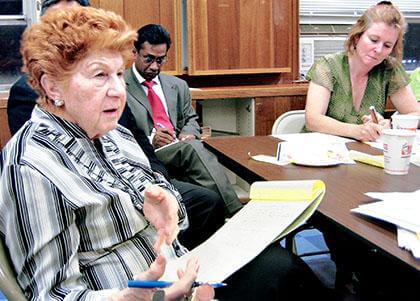By Anna Gustafson
Tackling sex trafficking in Queens — a hub for the activity because of its two international airports — is no easy feat, but borough residents are trying to fight the exploitation with calls for action from area publishers.
Individuals from the Center for the Women of New York and the Queens chapter of the United Nations Association met at Queens Borough Hall April 7 to discuss plans to rally support from community newspaper publishers against sex trafficking. The two groups plan to ask the publishers not to run ads for businesses that often employ individuals forced into sex work.
“These ads can show pictures of girls in positions meant to lure people,” said CWNY President Ann Jawin. “These ads increase the demand for and supply of victims.”
The meeting was held in response to a forum the CWNY held on sex trafficking at Borough Hall last month, and Jawin said she had seen syndicate interest from borough residents about addressing sex trafficking, particularly in Queens. Sex trafficking annually ensnares at least 800,000 people, the majority of them being women and children, according to federal statistics.
Many of those individuals end up in Queens, where they are physically and emotionally abused, according to borough officials who work with trafficking victims.
“Queens County-based JFK International and LaGuardia airports and the major national highways offer easy entry to the United States, New York City and metropolitan area market,” Karen Siegel, a psychologist who works with women and girls who have been trafficked, said at the meeting last month. “The U.S. Department of Justice designated the I-95 corridor as a major route for human trafficking.”
Jawin said they will ask publishers to sign agreements not to run the ads in the newspapers or on their respective companies’ Web sites. Hollis resident Arnold Gallardo pointed out it was especially important to focus on advertising on Web sites because so many individuals have been able to access victims through the Internet.
Gallardo suggested also going after some of the larger Internet advertisers, including Google.
“You need to target someone like Google in order to reach the demographics of people going to these places,” Gallardo said.
Patricia Powis, a Bayside attorney, said she thought CWNY should use social networking to attract attention for the cause.
“We could have a Facebook page so people can join us and we can reach a different audience,” Powis said.
After CWNY sends the letters to the publishers, Jawin said they plan to reach out to civic associations, religious organizations and politicians and ask them to urge the newspapers to sign the agreements.
“We want to stop these ads that are derogatory or exploitative of women,” Jawin said.
Reach reporter Anna Gustafson by e-mail at agustafson@cnglocal.com or by phone at 718-260-4574.

































